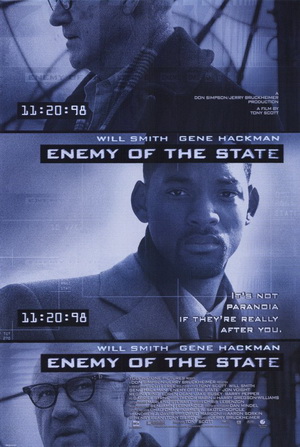10.07.13
Posted in Deception at 3:33 pm by Dr. Roy Schestowitz

Photo by Nicolas Shayko
Summary: News about the holy trinity of corporate media, corporations, and corporate contributions which drive politics
THE next US election will most likely bring a new face to Bush-style policies, putting a woman in charge [1] to perpetuate surveillance, assassination, torture, etc. Larry Lessig does not find much “Hope” as what he considers to be inherent corruption carries on [2-5] and the ‘leftist’ media definitely carries on doing its thing [6,7]. A recent discussion about control of the media by the spies and the government apparatus helped shed light on the role that free press should play if it exists (it hardly exists in the UK and the US, where it is typically referred to as “alternative media”). When the political systems are mostly controlled by corporations, which also control the media, then there is a deadlock on influence and a massive barrier pushing progress away and selling us unnecessary wars [8] (i.e. death to millions of innocent people). Professor Lessig found that out the hard way when he pushed for copyright sanity and repeatedly failed because of lobbyists and corrupt politicians (serving corporations that bribed them). Those who try to push for standards and software freedom typically meet those same barriers. █
Related/contextual items from the news:
-
-
In my view, the elements in the current game are first a grave threat (“the likely default on United States debt [which] could be catastrophic”) and second, the “forc[ing of] changes in existing law when it can’t with honesty say that it represents a majority”
-
On Thursday, Senator Elizabeth Warren and I will participate in an event hosted by the Constitutional Accountability Center (livestream here) to discuss a brief I submitted in a corruption (aka “campaign finance”) case that the Supreme Court will hear on October 8: McCutcheon v. F.E.C.
-
Ed_in_LA has a nice comment to my piece in The Beast about the original meaning of “corruption.” The basic thrust of his point is that originalism is about how judges read the Framers’ texts. And the word “corruption” (like “democracy,” or “separation of powers,” or “federalism”) doesn’t appear in any founding text (except “corruption of blood”).
-
The question in that case is whether aggregate limits on contributions are constitutional (I.e., do you have a constitutional right to give more than ~$125k to federal candidates every year). But in deciding that question, petitioners have asked the Court to revisit the standard of review that applies to limitations on “contributions.”
Therein lies the bomb: In Buckley (1976), the Court held that while limits on expenditures had to be evaluated under “strict scrutiny,” limits on contributions got “less rigorous” scrutiny. In McCutcheon, the petitioners (and Senator McConnell, who will also be arguing in the case) are asking the Court to apply the same standard to contributions and expenditures.
-
A study by Noam Chomsky’s nephew shows how ownership interferes in media coverage, forcing publications pursue private, greedy interests.
-
-
Last week I was invited to discuss the control of the media by the spies and the government apparatus by the Centre for Media Studies at the Stockholm School of Economics in Riga. Many thanks to Hans, Anders and the team for inviting me, and to Inese Voika , the Chair of Transparency International in Latvia, for setting the scene so well.
-
So USA Today asked two neoconservatives.
Permalink
 Send this to a friend
Send this to a friend
Posted in America, Europe, Finance at 3:12 pm by Dr. Roy Schestowitz

Summary: A few remarks regarding so-called “successful” (rich) countries and what can be said about the source of affluence (if any, i.e. if not made up or stolen but derived from natural resources like oil)
The Swiss authorities are said to be cracking down on (or at least trying to put an end to) the large-scale financial fraud that many of us call “success” when in fact it’s gaming and manipulation, or in other words systematic looting [1]. At the same time, Switzerland considers introducing the concept of basic income [2,3] as a reality in this high-GDP country (one of the wealthiest in the world, as measured per capita). Europe is trying to mimic US success when it comes to startups [4], but it must realise that careless lending is what made a lot of US corporations grow and even sustain themselves as giants, operating at a loss or running on government subsidies (taxpayers’ money and/or collective/national debt). What we have right now is a massive US debt economy with pretense of recovery [5], corporate deregulation masquerading as “liberalism” [6], and sheer poverty that’s the side-effect of huge economic disparity, leading to sheer desperation for the masses [7]. If a nation seeks to enjoy long-term dominance without constant wars (some countries would rather start a war every once in a few years to send a warning sign regarding conformity and obedience) and without running massive deficits (e.g. subsidising massive corporations that engage in large-scale surveillance and imperialism), then a model nation would be hard to find. Switzerland thrives in financial crimes; it harbours many rich people’s savings in what’s essentially tax havens. Just ask Elmer. In that sense, Switzerland enjoys great wealth for complicity in crimes. Whether it shares the loot with all the citizens in the form of basic wage (like Dubai does by incentivising citizens to stay atop the oil) does not matter. Whether it pretends (to save face) that it is cracking down on the financial crimes that many of its bankers engage in may not matter either. What matters is not a country’s total wealth but the value of its morality. Sadly, by the standards many tend to embrace, all that counts is the “bottom line”, which by convention means money. █
Related/contextual items from the news:
-
Switzerland’s market regulator launches foreign exchange investigation involving ‘multiple banks around the world’
-
Switzerland will hold a vote on whether to introduce a basic income for all adults, in a further sign of growing public activism over pay inequality since the financial crisis.
-
Some 120,000 Swiss signatories have put their names to a petition demanding a monthly minimum wage of $2,800 (2,500 Swiss francs) for every single member of the working adult population. Enough names have been collected for a government vote.
Anything less than the proposed amount would be deemed illegal, even for people working in the lowest paid jobs. A typical fast-food worker in the US earns roughly $1,500 per month.
-
Today, I’m delighted to announce we reached the milestone of 4,000 signatures. 4,000 people committed and ready to make a change, benefiting Europe’s entrepreneurial spirit and our digital future.
-
From President Obama on down, defenders of the status quo insist that the US economy has “recovered” or “is recovering”. Some actually see the world that way. They inhabit, imagine they inhabit, or plan to soon inhabit the world of the infamous top 1%. Others simply seek security in life by loyally repeating whatever that 1% is saying.
-
One of the oldest rhetorical tricks of free-marketeers has been the appeal to unintended consequences; state interventions, they claim – often reasonably – don’t work out as intended. But it’s not just statist policies that are vulnerable to unintended consequences. So too is neoliberalism, as Ed Miliband’s speech yesterday made clear.
-
“We never spoke of them. Why would we?” Learning the the truth about my great-grandfather, and 40,000 Americans during the Great Depression
Permalink
 Send this to a friend
Send this to a friend
Posted in Microsoft, Windows at 2:48 pm by Dr. Roy Schestowitz
Windows exposes users

Summary: More revelations about how the NSA is cracking down on the act of committing anonymous speech
IT IS no secret and it is no longer just “theory” territories when one alleges that opposition to war is almost like “terrorism” in the eye of state-employed spooks. If you are against CIA drone strikes, for instance, then you are treated as one of the ‘threats’ and ‘adversaries’ [1]. The same goes for people who oppose the NSA [2], which is breaking many laws anyway. People are being harassed (with their families) [3] and even arrested [4] for merely criticising the spies [4] (there are many other excuses for harassing and jailing such people).
A person has just explained how a telecom helped the government spy on him and Snowden’s leaks have just revealed that the Tor crack we wrote about [1, 2] was actually the work of the US government and it requires that the users use Tor on Microsoft Windows [5-7].
Remember this: Windows is developed with ‘help’ from the NSA. They are not even hiding it. █
Related/contextual items from the news:
-
A top secret NSA document provides context for yesterday’s abusive detention of Baraa Shiban
-
-
Earlier this month, OTM producer Sarah Abdurrahman, her family, and her friends were detained for hours by US Customs and Border Protection on their way home from Canada. Everyone being held was a US citizen, and no one received an explanation. Sarah tells the story of their detainment, and her difficulty getting any answers from one of the least transparent agencies in the country.
-
-
-
An NSA presentation released by Edward Snowden contains mixed news for Tor users. The anonymizing service itself appears to have foxed US and UK government snoops, but instead they are using a zero-day flaw in the Firefox browser bundled with Tor to track users.
-
Yesterday a new classified NSA document was leaked by Edward Snowden – titled ‘Tor Stinks’ in which ideas were being kicked around for identifying Tor users or degrading the user experience to dissuade people from using the Tor browser.
The NSA had a very hard time while tracking down all Tor users and monitoring their traffic, especially since Tor servers are all over the world, but they make tracking easier by adopting the following techniques:
By running their own hostile Tor nodes
Using zero-day vulnerability of Firefox browser
By tracking user’ browser Cookies
-
According to new revelations from data pilfered by whistleblower Edward Snowden, the National Security Agency has for years been going after users of Tor.1
Permalink
 Send this to a friend
Send this to a friend
Posted in Europe, Free/Libre Software at 2:30 pm by Dr. Roy Schestowitz

Summary: More examples of moves that characterise pursuit of software freedom and independence
The stampede towards Free (as in freedom) software — software that respects autonomy and national sovereignty that is — is visible for all to see in Europe (except perhaps in the UK with its 'special' USA/NSA relationship). Some of the latest examples are the French Gendarmerie [1], the government of Portugal [2], and the European Parliament [3], which recently made headlines because the NSA was spying on it (surveillance by bugging, no better than British spying on Belgian allies [4], perhaps preceding litigation [5]). Let’s hope that the surveillance scandals help remind citizens and their governments that without Free software there is no hope for privacy and self determination. Potential politicians can be spied on and ousted/shamed retroactively by selected ‘leaks’ (or smears) if their positions on certain policies are not in line with the foreign spies’ (or their bosses). It’s called espionage and it’s commonly treated as the most effective way to remotely disrupt distant parties. █
Related/contextual items from the news:
-
Using an open source desktop lowers the total cost of ownership by 40%, in savings on proprietary software licences and by reducing costs on IT management. Using Ubuntu Linux massively reduces the number of local technical interventions, says Major Stéphane Dumond. “The direct benefits of saving on licences are the tip of the iceberg. An industrialised open source desktop is a powerful lever for IT governance.”
-
The government of Portugal wants to increase its use of open source ICT solutions and open ICT standards, aiming to rationalise its IT and reduce costs, says André Vasconcelos from the Agency for Administrative Modernisation (AMA). “To allow comparing open source and proprietary solutions, we’ll make it compulsory to calculate the TCO over 4 years, including for maintenance, licences, migration and productivity.”
-
The European Parliament is increasingly turning to open source, according to a report by the parliament’s IT department. This type of solutions are mostly used for development, for application servers and web content management. Open source is also available to those members of the parliament using a laptop configured by the IT department.
-
-
Today Big Brother Watch, working with the Open Rights Group, English PEN and German internet activist Constanze Kurz, has announced legal papers have been filed alleging that GCHQ has illegally intruded on the privacy of millions of British and European citizens.
Permalink
 Send this to a friend
Send this to a friend
Posted in GNU/Linux, Kernel at 2:00 pm by Dr. Roy Schestowitz
Don’t mistake hens for eggs

Summary: Remarks on crediting the Linux project rather than the GNU project for what’s clearly the success of the latter (preceding Linux by 8 or so years)
HAVING spent the past week or so collecting positive GNU/Linux stories, I could not help but notice that nobody — almost nobody at all — even bothers to mention the GNU project. It’s the project which Linux essentially came from or got famous through.
Introductions to Linux tend to leave out the “GNU” [1] almost as though the “Linux way” [2] simply means not the equivalent of “UNIX way” but UNIX without all the software tool that GNU developers had replicated one by one for 8 years before Linux even existed. This is unjust. It’s “Linux” which gets the credit for going out to space (more along those lines in [3]), even though it’s usually Debian GNU/Linux that gets deployed outside of Earth after Windows failure. For the uninitiated, Windows failed ISS by catching malware. GNU/Linux does not have such issues [4] and it’s mostly –if ever — used for detecting and analysing malware [5]. Academics and even part-time Mac users choose GNU/Linux for technical advantages [6,7] and for some it is clear that GNU/Linux has won [8], with more people willing to give it a try [9].
Don’t let marketing people twist the success of the GNU project as a success of “Linux” (as in the kernel). This is definitely deceiving and it helps distract people from the philosophy that the operating system really came from, driving us further away from the goals.
Users may not care about “ideological camps” [9], but this is about the name, not the ideology, which users will be free to explore or ignore. GNU Hurd 0.5 is out now [10] (it predates Linux) and the Free Software Awards are still showing that there is more to GNU/Linux than Linux [12]. Glyn Moody recalls the early days of GNU [13] as it’s the 30th anniversary of the project [14] and the FSF, the steward of GNU, is hiring [15]. While the GNU project is three decades old [16,17], Software Freedom Day is only a decade old [18], and the GPL, a cornerstone of GNU which Linux embraced after being proprietary, is still proving to be popular [19], just like the software itself [20].
Don’t buy the media hype. The revolution came from GNU, not Linux. █
Related/contextual items from the news:
-
As most of you that are regular visitors to this site know, we not only write about Linux (opinions, tutorials and reviews) but we offer comprehensive training that can take anyone from a complete “Linux newbie” to someone who is prepared for their Linux Professional Institute Certification Exam as well as a career in the industry.
-
-
No, Planetary Resource isn’t kidding. It’s working on using Linux, open-source software, and commercial off-the-shelf hardware to build the first robotic asteroid miners.
-
Jack Wallen believes Linux is more secure than other platforms, but it’s only as secure as the packages installed.
-
Getting infected by malware is easy. You just have to open a suspicious file, or visit a malicious website, and boom, your computer is infected. On the other hand, analyzing and reverse engineering malware is a much difficult task that only experts can do with specialized tools. If you are one of those who are curious about how malware works, there is a Linux distro that comes with all the necessary tools for you to analyze malware.
-
I still use Linux on my main PC because I enjoy the flexibility and power it offers.
-
-
That’s a big deal. In August, Jon Peddie Research predicted that Bohemia’s ARMA III would drive more than $800 million in PC hardware sales all by itself, and JPR estimates the total market for PC gaming hardware to hit nearly $18 billion in 2013. That’s a lot of quarters, and it’s all funneled toward Windows machines.
-
We have all been there. Our first attempt at Linux. And we have all forgotten it. The human mind does a wonderful trick of glossing over less glamorous details, forgetting boring ones, heightening trauma and success, making us believe that our journey to becoming special, i.e. Linux users, was a fairly trivial man-it-up ordeal. We have long lost the touch with reality, which is, most people have no darn clue about operating systems, especially not one named Linux.
-
It’s hard for new users to understand the perspective and ideological camps behind free and open source software because there is nothing else like it in the world. Insisting that someone adapt immediately to the ideals put forth by FOSS is, in my opinion, an unrealistic expectation. When someone is new to a group or community, demanding they adhere to a set of rules they don’t understand can be overwhelming. In my opinion, a welcoming stance from the community members followed by a path of self discovery is what develops new users into the strongest supporters of free and open source software.
-
GNU Hurd has been hailed as the replacement for Linux kernel and 16 years later the developers have managed to release yet another update, 0.5.
-
The Free Software Foundation (FSF) and the GNU Project today announced the opening of nominations for the 16th annual Free Software Awards.
-
The first announcement about the GNU project appeared in September of that year, beginning Stallman’s long journey to recreate the community of hackers he had found then lost at MIT.
-
Just one day after the celebrated GNOME 3.10 release came the first updates. Mutter, Mutter Wayland, and GNOME Shell were updated today to fix some undetected bugs in the release yesterday. On top of the release, Gnomers will be celebrating the thirtieth anniversary of the GNU operating system.
-
The Free Software Foundation (FSF), a Boston-based 501(c)(3) charity with a worldwide mission to protect freedoms critical to the computer-using public, seeks a full-time senior systems administrator.
The ideal candidate will be a well-rounded GNU/Linux systems administrator who enjoys learning and problem-solving. (S)he will be familiar with the free software community and how it works, and will be more interested in making a substantial contribution to software freedom and having employment consistent with ethical ideals than obtaining the highest salary.
-
-
-
-
-
Permalink
 Send this to a friend
Send this to a friend
Posted in GNU/Linux at 1:18 pm by Dr. Roy Schestowitz
The broader context of “world domination” (which in itself implies tyranny)

Summary: Why GNU/Linux domination should not be mistaken for the instantaneous triumph of liberty and justice
GNU/Linux is by far the most dominant reliable hosting platform, suggest new figures [1]. This should not be interpreted as though “Linux owns the Internet” [2] as some people put it, but it does show that those who wish to host material — even harmful material like Facebook or NSA honeypots — choose GNU/Linux. Sure, GNU/Linux can be used to drive society forward, e.g. with Scientific Linux [3], but let’s remember that GNU/Linux is itself a tool — a modifiable tool whose licence ensures it is subjected to outside scrutiny and free continuity. But it is clear that GNU/Linux domination is not enough; and that’s where ethics and the F word Stallman speaks of (freedom) come into play. Techrights promotes a lot more than just GNU/Linux “world domination”. In the coming years we shall expand our scope of coverage to better align with this premise. Some coverage might not be purely technical, either. █
Related/contextual items from the news:
-
Of Netcraft’s ten most reliable hosting company sites for June of this year, eight are Linux and two are FreeBSD
-
Most of those heavyweights champions of “Free as in Freedom” software are the same companies currently under scrutiny for the privacy risks of their business models, and for making the kind of spying and abuses exposed by E. Snowden much easier to implement.
That list should be titled “How corporations (and governments) own way too many data about people, also thanks to Linux”, and Free Software in general. Luckily, the same software may also be used to build alternatives without those problems, yet really usable by people with just the skills to use Facebook or Gmail.
-
Millions around the world, both scientists and non-scientists, use Scientific Linux, an operating system developed for particle physics.
Permalink
 Send this to a friend
Send this to a friend
Posted in Site News at 1:03 pm by Dr. Roy Schestowitz

Summary: An observation regarding the state of GNU/Linux (plus FOSS) in the alternative media and a call for action
Audiocasts (or “podcasts” for those who prefer this more common term) are a convenient medium with which to pass information to drivers or people who work around the house and cannot face a monitor. For some it’s a way of occupying oneself while doing exercise like running. Not many people would sit down for two hours staring at a static screen in order to just listen to a stream of audio (unless multi-tasking). For the producers, an audiocast can be a lot of work or very little work, depending on how it’s produced. If there is prior planning or even full scripting, many attempts and a lot of preparation may be needed. Otherwise it can be as simple as picking up a microphone and having a conversation, perhaps post-editing for some extra polish.
In October 2010 — that’s three years ago — Tim and I started working on a show called TechBytes. This show is still alive, but its format has changed over the years. The frequency of shows too has changed. Looking around us for an assessment of the state of GNU/Linux audiocasts, things do not look so good. Some shows have gone totally silent, some went quiet, and only few remained as active as before. A year after we were a feature on FLOSS Weekly Leo Laporte officially stepped out of FLOSS Weekly (other hosts were/still are [1] tested and some left thereafter). Some nice shows simply went away, leaving mostly a bunch of small/new players, new diluted forms of Linux/UNIX shows from Jupiter [2], Ubuntu-centric shows [3-5], and Tux Radar, which is only a few years old [6-8]. Some of the shows that I have been following for years are no more or rarely anymore (maybe a few episodes are released per year or once in a few years). This is not a good thing and taking into account the closure of key sites like Groklaw we should seriously think what can be done to save independent pro-Free software press/media. Without it, we have no public voice.
There is a certain apathy if not active denial/cognitive dissonance over the demise of GNU/Linux- and Free software-friendly (even Open Source-centric) topics in the corporate media. A lot of sites that used to thrive and a lot of matters which occupied the mainstream media are no longer there, or are hardly ever there. This does not mean that GNU/Linux and Free software are going away; they are actually widespread and popularised more than ever before. They are becoming an industry standard. But we sure have a problem when even companies that purport to have embraced “Linux” are openly promoting DRM, censorship, binary blobs, and even remote-accessible back doors (for our ‘protection’). If the ideas that accompany Free software are not out there for people to absorb lobbyists of companies like Apple and Microsoft can take advantage of it and revoke progress. Please try to support sites which continue to spread the message of Free software because without media presence, ideas can be weakened or altogether vanish. The problem is not specific to multimedia; even paper publications and digital publications are going away. █
Related/contextual items from the news:
-
Instead of trying to create a single, static firmware, OpenWrt provides a fully writable filesystem with package management. This frees you from the application selection and configuration provided by the vendor and allows you to customize the device through the use of packages to suit any application. For developer, OpenWrt is the framework to build an application without having to build a complete firmware around it; for users this means the ability for full customization, to use the device in ways never envisioned.
-
-
-
This week’s episode wraps up our presence at Ohio Linux Fest 2013.
-
-
In this episode: No more Groklaw and no Ubuntu Edge. ZTE’s Firefox phone sells out quickly on eBay, and the exFAT filesystem is now open source. And as usual, we also have discoveries, challenges, brains and a ballot!
-
In this episode: Encryption is dead, but there are lots of great games in the new Humble Indie Bundle. FreeBSD ditches GCC and Intel clashes with Ubuntu. We’ve got some great discoveries, we dust down the old wheel of misfortune and discuss your opinions in the Open Ballot.
-
Permalink
 Send this to a friend
Send this to a friend
Posted in GNU/Linux, Microsoft, Windows at 12:08 pm by Dr. Roy Schestowitz
Like putting a racing car in some lane with a 30-mile speed limit

Summary: Nvidia shows how technical superiority of GNU/Linux is being impeded by an artificial need for downward ‘parity’ with Windows
ABOUT a year ago, Finnish comedian Linus Torvalds (strange sense of humour) received some desired (or conversely, unwanted) publicity after he had used his carte blanche for cursing — the thing which people like Richard Stallman don’t have. He gave Nvidia the finger. Maybe this was fruitful, but the point of the matter is, it helped show that Nvidia was behaving badly towards Linux, despite trying to sell many Tegra boards (to be sold with Android/Linux on board). “Nvidia cripples Linux drivers because of Windows,” claims a new article [1], requiring no benchmarks such as [2] but only an understanding of how Nvidia makes its drivers. This was known in prior years (they try to match the sides even to the detriment of Linux), but the example cited is new. Nvidia basically neglects Linux or treats it like a second-class citizen at best, even when it’s technically better. Nvidia would like to change these perceptions, so it is liaising with Red Hat [3] and competing with Nouveau [4] on decent drivers which can be confirmed not to have NSA back doors (X.Org Server is free software [5], the driver from Nvidia is not). Nvidia must be feeling the pressure from Radeon [6], which is moving forward. Frankly, the right thing to do right now is boycott NVidia and buy from its competition, notably AMD. █
Related/contextual items from the news:
-
The company have reportedly crippled their Linux drivers to ensure parity with Windows. An Ubuntu user discovered that after an update to Nvidia’s non-free drivers his system was restricted to support only three monitors. The user wanted to connect 4th monitor using two GTX 560Ti graphics cards with a SLI connector.
-
In several articles now there’s been a performance regression found in GpuTest’s Plot3D with the older Mesa 9.1 release doing better than Mesa 9.2.
-
Jerome Glisse has long been involved with open-source Linux graphics drivers, but in recent months he hasn’t announced any major breakthroughs like in past years. However, at Red Hat they have struck up a partnership with NVIDIA to work on a new device-agnostic API for the Linux kernel that can benefit the graphics drivers.
-
While the Nouveau driver has been developed entirely through reverse-engineering the NVIDIA binary blob and is largely developed by community-based developers (many of whom are students), they have made a lot of progress in recent months in pushing forward with new features and functionality for this open-source NVIDIA Linux graphics driver.
-
While most developers are focused around new innovations for Wayland (or Mir), there’s still life ahead for the X.Org Server in maintaining legacy support and other cases where the xorg-server will not die for years to come. In improving the X.Org Server, Adam Jackson at Red Hat has been working on rewriting the GLX portion of the X.Org Server.
-
AMD developers working on the Radeon X.Org driver (xf86-video-ati) have enabled GLAMOR acceleration support by default at build time.
GLAMOR provides 2D acceleration on the Radeon HD 7000 “Southern Islands” GPUs and newer Radeon GPUs via OpenGL rather than implementing the 2D hardware acceleration by hand with EXA in the DDX driver. While HD 7000 series hardware is now common place and the RadeonSI driver maturing well in recent months, GLAMOR is now being enabled by default at build time for the xf86-video-ati driver.
Permalink
 Send this to a friend
Send this to a friend
« Previous Page — « Previous entries « Previous Page · Next Page » Next entries » — Next Page »
Further Recent Posts
- 2017: Latest Year That the Unitary Patent (UPC) is Still Stuck in a Limbo
The issues associated with the UPC, especially in light of ongoing negotiations of Britain's exit from the EU, remain too big a barrier to any implementation this year (and probably future years too)
- Links 7/1/2017: Linux 4.9.1, Wine 2.0 RC4
Links for the day
- India Keeps Rejecting Software Patents in Spite of Pressure From Large Foreign Multinationals
India's resilience in the face of incredible pressure to allow software patents is essential for the success of India's growing software industry and more effort is needed to thwart corporate colonisation through patents in India itself
- Links 6/1/2017: Irssi 1.0.0, KaOS 2017.01 Released
Links for the day
- Watchtroll a Fake News Site in Lobbying Mode and Attack Mode Against Those Who Don't Agree (Even PTAB and Judges)
A look at some of the latest spin and the latest shaming courtesy of the patent microcosm, which behaves so poorly that one has to wonder if its objective is to alienate everyone
- The Productivity Commission Warns Against Patent Maximalism, Which is Where China (SIPO) is Heading Along With EPO
In defiance of common sense and everything that public officials or academics keep saying (European, Australian, American), China's SIPO and Europe's EPO want us to believe that when it comes to patents it's "the more, the merrier"
- Technical Failure of the European Patent Office (EPO) a Growing Cause for Concern
The problem associated with Battistelli's strategy of increasing so-called 'production' by granting in haste everything on the shelf is quickly being grasped by patent professionals (outside EPO), not just patent examiners (inside EPO)
- Links 5/1/2017: Inkscape 0.92, GNU Sed 4.3
Links for the day
- Links 4/1/2017: Cutelyst 1.2.0 and Lumina 1.2 Desktop Released
Links for the day
- Financial Giants Will Attempt to Dominate or Control Bitcoin, Blockchain and Other Disruptive Free Software Using Software Patents
Free/Open Source software in the currency and trading world promised to emancipate us from the yoke of banking conglomerates, but a gold rush for software patents threatens to jeopardise any meaningful change or progress
- New Article From Heise Explains Erosion of Patent Quality at the European Patent Office (EPO)
To nobody's surprise, the past half a decade saw accelerating demise in quality of European Patents (EPs) and it is the fault of Battistelli's notorious policies
- Insensitivity at the EPO’s Management – Part V: Suspension of Salary and Unfair Trials
One of the lesser-publicised cases of EPO witch-hunting, wherein a member of staff is denied a salary "without any notification"
- Links 3/1/2017: Microsoft Imposing TPM2 on Linux, ASUS Bringing Out Android Phones
Links for the day
- Links 2/1/2017: Neptune 4.5.3 Release, Netrunner Desktop 17.01 Released
Links for the day
- Teaser: Corruption Indictments Brought Against Vice-President of the European Patent Office (EPO)
New trouble for Željko Topić in Strasbourg, making it yet another EPO Vice-President who is on shaky grounds and paving the way to managerial collapse/avalanche at the EPO
- 365 Days Later, German Justice Minister Heiko Maas Remains Silent and Thus Complicit in EPO Abuses on German Soil
The utter lack of participation, involvement or even intervention by German authorities serve to confirm that the government of Germany is very much complicit in the EPO's abuses, by refusing to do anything to stop them
- Battistelli's Idea of 'Independent' 'External' 'Social' 'Study' is Something to BUY From Notorious Firm PwC
The sham which is the so-called 'social' 'study' as explained by the Central Staff Committee last year, well before the results came out
- Europe Should Listen to SMEs Regarding the UPC, as Battistelli, Team UPC and the Select Committee Lie About It
Another example of UPC promotion from within the EPO (a committee dedicated to UPC promotion), in spite of everything we know about opposition to the UPC from small businesses (not the imaginary ones which Team UPC claims to speak 'on behalf' of)
- Video: French State Secretary for Digital Economy Speaks Out Against Benoît Battistelli at Battistelli's PR Event
Uploaded by SUEPO earlier today was the above video, which shows how last year's party (actually 2015) was spoiled for Battistelli by the French State Secretary for Digital Economy, Axelle Lemaire, echoing the French government's concern about union busting etc. at the EPO (only to be rudely censored by Battistelli's 'media partner')
- When EPO Vice-President, Who Will Resign Soon, Made a Mockery of the EPO
Leaked letter from Willy Minnoye/management to the people who are supposed to oversee EPO management
- No Separation of Powers or Justice at the EPO: Reign of Terror by Battistelli Explained in Letter to the Administrative Council
In violation of international labour laws, Team Battistelli marches on and engages in a union-busting race against the clock, relying on immunity to keep this gravy train rolling before an inevitable crash
- FFPE-EPO is a Zombie (if Not Dead) Yellow Union Whose Only de Facto Purpose Has Been Attacking the EPO's Staff Union
A new year's reminder that the EPO has only one legitimate union, the Staff Union of the EPO (SUEPO), whereas FFPE-EPO serves virtually no purpose other than to attack SUEPO, more so after signing a deal with the devil (Battistelli)
- EPO Select Committee is Wrong About the Unitary Patent (UPC)
The UPC is neither desirable nor practical, especially now that the EPO lowers patent quality; but does the Select Committee understand that?
- Links 1/1/2017: KDE Plasma 5.9 Coming, PelicanHPC 4.1
Links for the day
- 2016: The Year EPO Staff Went on Strike, Possibly “Biggest Ever Strike in the History of the EPO.”
A look back at a key event inside the EPO, which marked somewhat of a breaking point for Team Battistelli
- Open EPO Letter Bemoans Battistelli's Antisocial Autocracy Disguised/Camouflaged Under the Misleading Term “Social Democracy”
Orwellian misuse of terms by the EPO, which keeps using the term "social democracy" whilst actually pushing further and further towards a totalitarian regime led by 'King' Battistelli
- EPO's Central Staff Committee Complains About Battistelli's Bodyguards Fetish and Corruption of the Media
Even the EPO's Central Staff Committee (not SUEPO) understands that Battistelli brings waste and disgrace to the Office
- Translation of French Texts About Battistelli and His Awful Perception of Omnipotence
The paradigm of totalitarian control, inability to admit mistakes and tendency to lie all the time is backfiring on the EPO rather than making it stronger
- 2016 in Review and Plans for 2017
A look back and a quick look at the road ahead, as 2016 comes to an end
- Links 31/12/2016: Firefox 52 Improves Privacy, Tizen Comes to Middle East
Links for the day

























 Content is available under CC-BY-SA
Content is available under CC-BY-SA